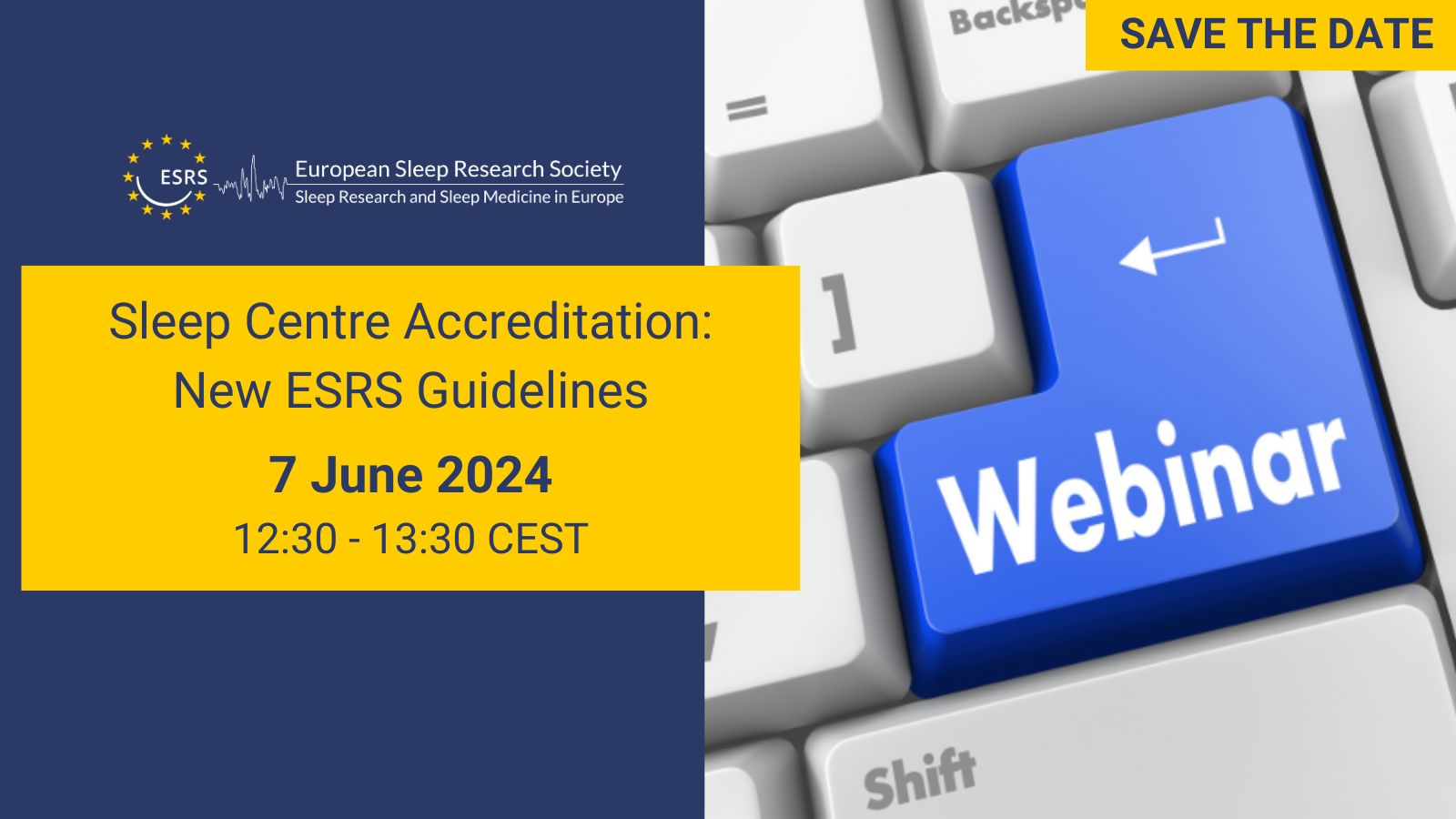
- This event has passed.
Hot Topics in Obstructive Sleep Apnea – A European View
10 March 2023 @ 2:00 pm - 4:00 pm CET

REGISTER for the upcoming ESRS webinar on “Hot Topics in Obstructive Sleep Apnea – A European View”. On Friday, 10 March 2023 at 14:00 – 16:00 CET, Prof. Dr. Dirk Pevernagie will lead an expert panel of 5 presenters and subsequent discussion on this critical topic.
The diagnosis of OSA revolutionised – Dr. Erna Sif Arnardottir (IS)
In this talk, Dr. Arnardottir will talk about the future of OSA diagnosis based on the work of the Sleep Revolution consortium. The Sleep Revolution project receive a 15 million euro grant from EU Horizon 2020 Research and Innovation Programme no. 965417 (https://sleeprevolution.eu/). The Sleep Revolution, is an inter-disciplinary and international research and development project with 37 partner institutions and companies in Europe and Australia. Sleep Revolution aims to introduce an approach based on machine learning to assess sleep apnea severity and treatment needs. Through new technological solutions and a digital management platform, the project aims to bring together researchers, patients and healthcare professionals to provide beyond the current state-of-the-art method of accurate sleep apnea diagnosis and optimal treatment.
Dr. Arnardottir’s talk will focus on the validation of self-applied polysomnography, both double set-up with traditional PSG, the objective quality of self-applied studies as well as the subjective experience of research participants as well as enhanced machine learning algorithms for analysis.
OSA and comorbidities – Prof. Dr. Maria Bonsignore (IT)
Patients with comorbidities are a common occurrence in daily practice, and sleep disordered breathing is no exception. Some comorbidities are very frequent in OSA patients, and include systemic hypertension, metabolic syndrome and diabetes, and depression. Other major comorbidities of OSA are ischemic heart disease, stroke, heart failure, chronic kidney disease, and cancer. It is often hard to establish whether OSA contributes to the pathogenesis of comorbidities, and bidirectional relationships between OSA and other diseases are a current field of investigation. Highly complex patients are encountered in clinical practice, and require cooperation among different Internal Medicine Specialists for an optimal management besides PAP treatment.
Evidence based treatment of OSA – Prof. Dr. Walter McNicholas (IE)
While many reports have indicated that obstructive sleep apnoea (OSA) is an independent risk factor for cardiometabolic and neuropsychological comorbidity, the evidence of benefit to comorbidity from continuous positive airway pressure (CPAP) therapy is less convincing. A recently published report prepared for the Agency for Healthcare Research and Quality (AHRQ) of the U.S. Department of Health and Human Service concluded that the published evidence from randomized controlled trials (RCTs) fails to support a benefit from CPAP therapy for OSA in outcomes that include cardiometabolic comorbidity, cognitive function, quality of life and driving accident risk. While this report makes valid criticisms in certain areas, the conclusions are compromised by many limitations including the highly selective nature of included studies, patient selection such as non-sleepy patients, and non-inclusion of highly relevant outcomes such as sleepiness. Most reports evaluating CPAP outcomes in OSA have used the apnoea-hypopnoea index (AHI) as the primary measure of OSA severity, but more recent reports have identified other variables such as hypoxaemia and daytime sleepiness as important predictors of comorbidity, which should be considered in patient selection. Furthermore, specific aspects such as nocturnal blood pressure (BP) dipping have a major impact on the BP response to CPAP. The level of treatment compliance is also important and some major studies such as the SAVE trial that found no benefit from long-term CPAP therapy in the secondary prevention of cardiovascular comorbidity, did show a benefit when patients with good CPAP compliance were analysed. Finally, the evidence supports a greater benefit of CPAP in neuropsychological comorbidity, with benefits reported even in patients with mild OSA.
Alternatives to CPAP include mandibular advancement device (MAD) therapy, where the evidence indicates this to be equivalent to CPAP in patients with mild-moderate OSA, but inferior in patients with severe OSA. Weight loss is particularly beneficial to inflammatory and metabolic aspects of OSA. Pharmacological therapy of OSA is a major research topic and medications have been reported to be associated with significant benefits in pathophysiological aspects including upper airway collapsibility, arousal, respiratory control, and sleepiness.
To treat or not to treat? the Baveno perspective – Prof. Dr. Winfried Randerath (DE)
In clinical practice, the indication for OSA treatment has been driven by the number of breathing disturbances during sleep. However, there is only a weak correlation between clinical apnoea-hypopnoea index on the one hand, and the symptoms and outcomes on the other hand. Moreover, CPAP adherence is limited, especially in those patients with minor symptoms. This presentation will discuss new concepts to better select patients for positive airway pressure treatment. This guides to new classification systems, focusing on patient relevant outcome parameters and prognosis.
National knowledge-driven management of OSA – the Swedish approach – Prof. Dr. Ludger Grote (SE)
A nation-wide initiative to improve knowledge-based management for OSA patient management has recently been launched in Sweden. This paper describes the development of the OSA care-program. One central element is the harmonisation of the diagnostic process and the shared decision making for OSA treatment. Hereby, we implemented a novel treatment decision matrix based on available evidence.
A national expert group including medical and dental specialists, nurses, and patient representatives developed the knowledge-driven management model. A Delphi-round was performed amongst experts from all Swedish regions (N=24). Evidence reflecting treatment effects was extracted from systematic reviews, meta-analyses and randomized clinical trials.
The three components of the knowledge-based management program for OSA include A) national guidelines for diagnosis and treatment of OSA, B) a national care plan describing the actual work steps for OSA patients and C) the national quality registry for OSA for monitoring of the quality of care at the single sleep center and regional level. All three elements are in place now and nation-wide implementation of this program is ongoing. The prospective outcome is monitored by the Swedish sleep apnea registry (SESAR).
REGISTRATION OPEN
Stay tuned for more information on each presentation.





